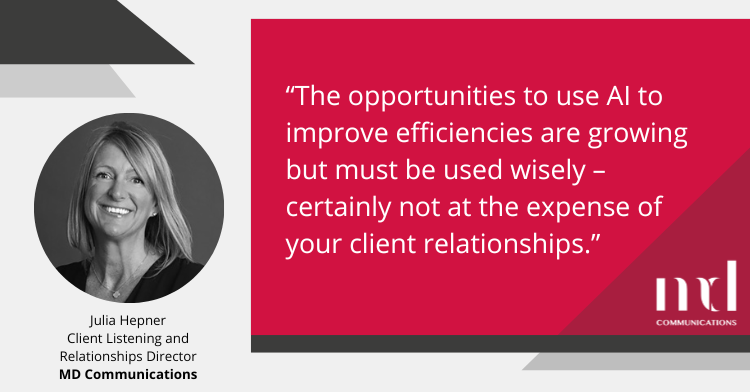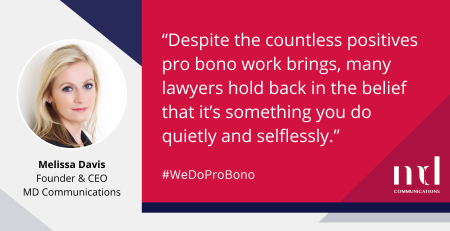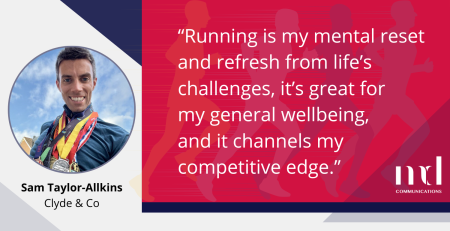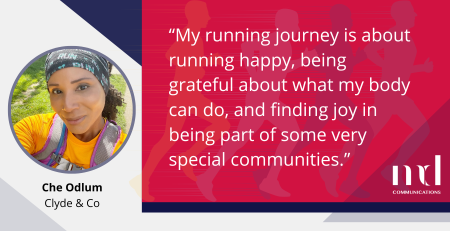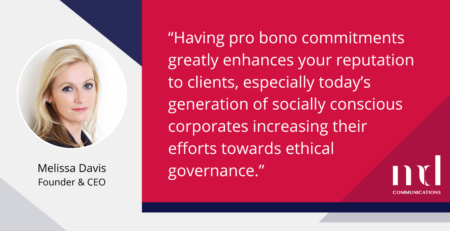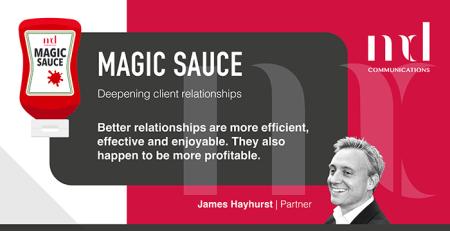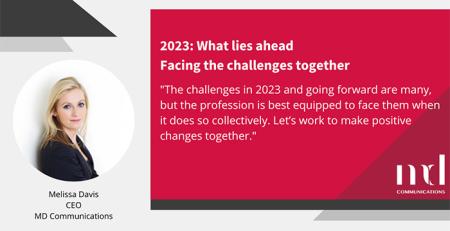Client Listening and Relationships Director Julia Hepner looks at the use of AI in the legal world, and explains why personal relationships will always win out.
With the increasing prominence of AI in all sectors, it’s hard not to feel some trepidation that in this brave new world, we are beginning to lose the human touch.
Although online platforms and client surveys are useful to retrieve quantitative metrics, there are inherent problems with using AI for detailed qualitative client feedback.
Perception matters
The first is the client’s perception. How valued would I feel if I got a link to a computer-generated survey, rather than a meeting with the advisor? My advisor is not expending any of their own time, but they are imposing a time drain on me. As a client, that may leave a bad taste. Compare that to getting a call from my advisor begging 10 minutes of my time because they value my opinion. Now I can see they are invested in me, that they want to get things right and are prepared to spend some of their own (non-chargeable) time listening to my views.
Inviting clients to offer feedback is vital. More so when things have not gone as well as hoped.
Technical mistakes happen. The natural instinct is to shy away from a potentially spiky situation, because you are on the back foot; ignoring the impact a mistake might have on a relationship is foolish, as this is the very point when client listening is needed. Most clients are forgiving about errors, though only if you deal with the situation in the right way. Technology cannot repair a fragile relationship; only a human can, though you must ensure you use the right person for the job.
Who should do the listening?
The Partners of many firms closely guard and manage their own client relationships. Therefore, it is becoming increasingly common for professional services firms to have dedicated client relationship managers, separate from the day-to-day account management. However, outsourcing the listening function to an experienced professional has a number of distinct advantages.
- Being independent and objective often bears the most fruit in delivering honest and often surprising feedback. It is far easier for clients to give honest feedback to someone they do not know; and getting a true critique is essential.
- Showing that you are prepared to make outward investment in client listening demonstrates how important your client’s opinions are to you.
- There are few, if no, preconceived opinions on what the client will say, or why. Which means that listening to what the client is actually saying is easier and the feedback is untainted by bias.
These combine to deliver a powerful message to your client: that you care. There is no better PR.
So, what are you listening to?
While the common perception is that clients of professional service firms will always complain about fees, that is surprisingly rare.
In my experience, one of the most common areas for dissatisfaction (or indeed, satisfaction) is personality fit. An AI driven client listening programme cannot navigate the nuances of the relationship between advisor and client. Failing to adopt a humanistic approach could have a significant negative impact on individuals and relationships, internally or with the client itself.
Reporting and delivering change
With the listening done, the penultimate stage in the process is reporting. While AI can produce dashboards, comparisons and benchmarking scores, it cannot be honest and sensitive. It cannot adapt its reporting approach depending on the recipient of potentially negative feedback.
Although reports should usually be shared openly with teams, we need to consider how appropriate it is to share sensitive information about named individuals. A good report will provide recommendations for improvement, bearing in mind a plethora of factors, while being creative and inventive. Something I would argue AI would struggle with.
The most important stage is the final one: not only implementing change but being transparent about it. The client needs to see not only that their voice has been heard, but that the listening has had an impact and triggered positive change.
The opportunities to use AI to improve efficiencies are growing but must be used wisely; and certainly not at the expense of your client relationships.
I will end with one caveat. Some clients might want you to listen to them using AI technology, or indeed, not want to take part in the exercise at all. You will only know which ones by asking, then listening to their answer.
If you would like help with client listening, please contact me.


